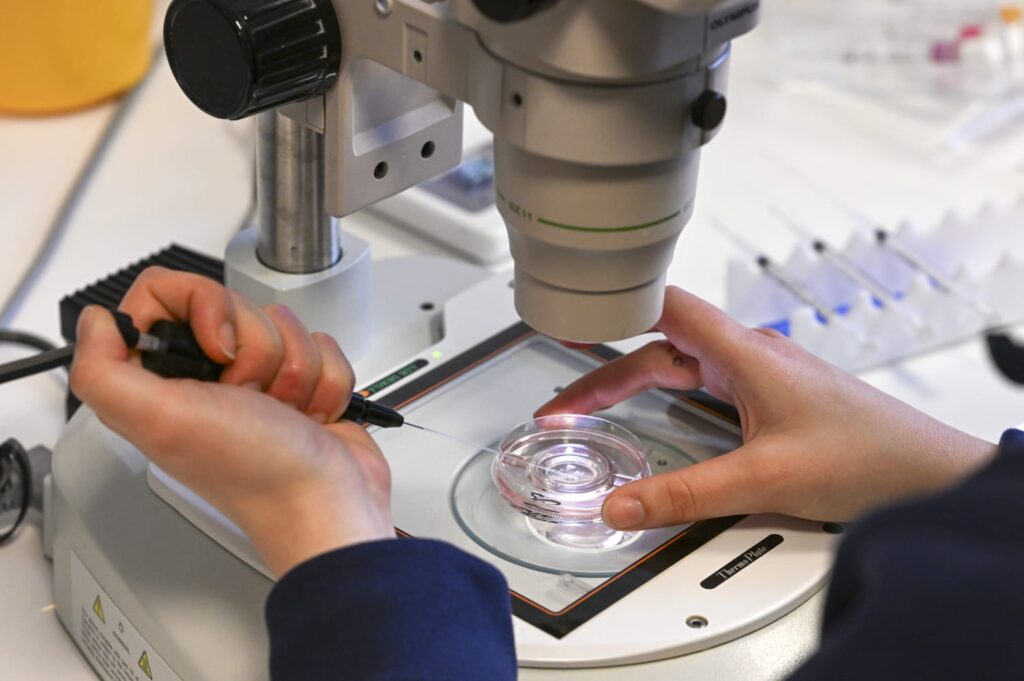Less than a week after the Alabama Supreme Court ruled that embryos produced through in vitro fertilization are considered children. Two of the state's largest IVF providers have suspended their services due to the legal implications of the decision.
The University of Alabama at Birmingham was the first to announce the change Wednesday. Then, another medical provider, Alabama Fertility, posted a statement on social media on Thursday saying it was putting IVF treatments on hold.
“We are committed to reaching out to patients who will be affected today to find solutions and alerting lawmakers to the far-reaching negative impact this ruling will have on women in Alabama. ” said Alabama Fertility.
UAB spokeswoman Hannah Echols said the health system will continue to offer egg retrieval, but will no longer fertilize eggs or develop embryos.
“While we regret that this will impact patients' attempts to have babies through IVF, we do not believe that patients and physicians may face criminal prosecution or punitive damages for following the standard of care for IVF treatment. We need to evaluate the possibility of doing so,” Echols said in a statement.
Performing in vitro fertilization involves combining sperm and eggs to create embryos in a laboratory and then implanting one or more of those embryos into a person's uterus. Extra embryos are often frozen and stored. However, embryos are often discarded if they have a genetic abnormality or if the patient does not need them.
IVF providers are now concerned that they and their patients could face legal penalties if they discard embryos, thanks to an Alabama Supreme Court ruling.
However, many questions remain about the meaning of this ruling. The judge's decision came after a unique incident in which a person wandered into an unlocked storage area of a fertility clinic in Mobile, Alabama, and dropped several frozen embryos on the floor. be.
The court ruled on February 16 that because frozen embryos were considered human beings, the clinic's failure to secure a place to store them was a violation of the state's death tort law, which states that unjust or negligent conduct that results in the death of a person is a civil crime. The court ruled that it was in violation of.
Alabama Fertility patient Megan Cole had a rare blood disorder that made it impossible for her to have children safely, so she planned to start a family through in vitro fertilization and surrogacy. Cole's surrogate mother, who will carry her baby, was scheduled to undergo an embryo transfer on Friday.
But last night, Cole's doctor called to say his transplant appointment had been cancelled. Now, she doesn't know when she will be able to use her embryos.
“I thought tomorrow was going to be one of the best days of my life and now I'm just devastated,” she said.
But other fertility facilities in the state continue to offer IVF in hopes that the legal mess will soon be resolved in their favor.
“We are not suspending IVF services; we do not feel a reasonable need to do so,” said Dr. Brett Davenport, a reproductive endocrinologist at the North Alabama Fertility Institute.
“I have worked hard to adjust consent forms so that patients who are currently undergoing IVF or who are about to undergo embryo transfer can discuss this law in a place where they are aware of it. .There is an impact,” he added.
Gail Deddy, senior staff attorney at the Center for Reproductive Rights, said the Alabama ruling means that IVF providers can face civil rather than criminal penalties in some circumstances and must pay damages. He said that this means that it will not happen.
The Alabama State Medical Association on Wednesday asked the Alabama Supreme Court to reconsider or put the ruling on hold so residents can continue to receive in vitro fertilization.
The ruling said that this ruling, and UAB's subsequent decision to suspend IVF treatments, would “limit fertility options for those who want to start a family, so that they may not be able to have children, grandchildren, nieces, nephews, cousins, etc.” “The number is likely to decline.”
Resolved: The National Infertility Association called the ruling cruel, saying UAB had an “impossible option to suspend IVF procedures for people hoping to start families or put patients and doctors at risk of prosecution.” I was forced to make a decision.”
In 2021, more than 97,000 babies were born in the United States using assisted reproductive technologies, including in vitro fertilization. Worldwide, more than 500,000 births occur each year through in vitro fertilization.


